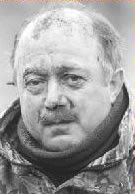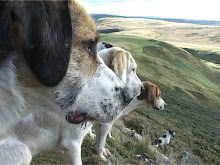Grass is rizI wonder where de bodies is
But that's absoid
News and views from countryman and television presenter Willy Poole


Patois:
Speaking French is bad enough, but now I am having to learn Norman as well. It is a Patois and I have been speaking patois various all my life. Nowhere has more Patois than England - for instance I can speak Cornish, Devon (Anglo- Saxon) N.Yorkshire, Northumbrian, Ulster, I used to think that I spoke good southern American until I was told
'No, but you speak good Nigra', I do a fair Ballspond
Road.... I once wrote an entire 1,000-word article in
Northumbrian dialect; the Editor was not 'best suited'. Dialects (patois) have always fascinated me. When I was a child every field on the farm had a name in Cornish. Nobody could translate them for me. Nobody speaks Cornish any more except, the odd Druid and there are some very odd ones. The last person who spoke native Cornish was a lady called Dolly Pentreath and she died in 179? I am told that Cornish was very similar to Bretagne, or even some versions of Welsh, but - watch out the Cornish hate the Welsh (‘they bliddy old welshies") don't ask me why.
Place names are funny things. There was an isolated steading on the Cheviot (now there's an odd one - Cheviot is supposed to be Pictish) Hills. The Steading was beside an old drove road and it was called 'Sea View': This was odd as it was 20 mils from the North Sea, for any crow with several hill ranges in between. I asked a local chap about the name. He laughed and said that it was probably 'See Few' and 'Man, 'he said' they were gey right aboot that'.
To go back to Norman Patois - it is strongly preserved amongst older people in remoter places, but if you are a keen hunting man in England, much Norman will be familiar to you. Many of you will have shouted 'War Riot!' at a young hound hunting a rabbit. Have you ever asked yourself 'why?' after all the young hounds are not breaking shop windows and stealing TV sets. No - Ryot was Norman for Rabbit. There is a 'Ferme Ryot' just up the road from here. What about 'Tally Ho ?' 'Il est haut' is Norman for ' he is roused'. Now try saying 'Il est haut' several times very quickly and you soon get 'Tilly ho!' So the French French have changed it to 'Tai-oh!". The French think that that Normans are a bit 'Local', as the posh people in Sussex refer to those who sound a bit 'Saxon'.
Ghyll Head is an iconic name for the Family Poole. Ghyll is a norse word for Slack, Haugh, Goyle, or any other patois word meaning a small valley. Ghyll head is an old stone house on the banks of Lake Windermere.
The northern basin of Windermere - Photo courtesy John Morrison
It was the ancestral home of the Pooles for some 400 years. It is now an adventure HQ for Manchester council. The Pooles fell out of it when the 19C Incumbent - John Poole set off in his boat one dark and stormy night for a rendezvous on the other side of the Lake. He was never seen again, although the empty boat was washed up on the Lakeside. That was the end of the family connection with the Lakes after some 600 years, although you will find many Memorials amongst the stones in the charming little Church at Cartmel Fell - just over the hill. My father celebrated the family connection by registering Ghyllhead as the Kennel Name for all his dogs - "There were Pooles before there were Lakes" so no more Pooles, but you can still find Ranter and Nigel of Ghyllhead in the Book - 'what's in a name?'

